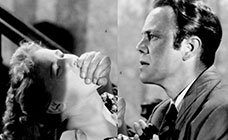|
|
|
|
House by the River
|
 |
|
For
many decades overlooked and grossly underrated by critics and scholars alike, House by the River has only recently
received the re-evaluation it richly deserves. Made as a B film in the wake of
the commercial failure of Secret Beyond the Door … (1948) – and ushering
in Fritz Lang’s highly austere, severe works of the 1950s – it lays bare the
perverse underpinnings of the director’s imagination.
Thomas Elsaesser once described Lang's overriding obsession
as the “creation and uncreation of those who appear on
the screen … Lang is on the ‘demonic’ side, the side of power and pessimism”.
Of all his films, House by the River is most intensely, unsettlingly fixed on the demonic or vampiric aspects of the
creative process: Stephen (Louis Hayward) the writer – a perverse alter ego of Lang the artist – can only
“unblock” himself once he has killed.
The
thematic logic of the drama is as precise as it is bleak: the generalised abjectness of the world
presented is clinched by images of the dirty river (offering up its repressed
secrets), draining sink water, and a crawling spider whose only destiny is to
be splattered. No one is innocent, all are complicit in this claustrophobic
social circle where transgression is endlessly inviting, desire inevitably
strays, and even the most ordinary citizen enjoys the “trashy” culture of
popular crime literature.
Lang’s
investment in this vision is conveyed by the loving meticulousness with which
he stages the sex attack/murder scene: a highpoint of his career, it is
structured upon what critic Jacques Lourcelles describes as “an eroticism of frustration, a morbid élan”, a drawn-out tension
that inexorably draws the viewer into a disturbing kind of sympathy with the
deranged Stephen – who registers as the Everyman version of Peter Lorre’s Grand
Criminal in Lang’s M (1931).
The
film also marks (here the low budget proved fortuitous) a return by Lang to a
certain deliberate, silent-era primitivism in his mise en scène: a rigorously minimalistic use of repeated
compositions (of successive women on the stairway, for instance), married to a
suitably histrionic mode of acting, and, for its time, a quite advanced sense
of the possibilities of sound design (particularly the use of silence and
contrapuntal noise effects).
As
much as it intersects with Alfred Hitchcock’s noirish tales of the transference
of guilt between characters, House by the
River is also an intriguing precursor to Charles Laughton's The Night of the
Hunter (1955) in its haunted, dreamlike lyricism – especially
evident in the spookily poetic underwater imagery.
Note: A
greatly expanded treatment of these ideas forms a chapter (started in the late
1990s) of Joe McElhaney’s superb anthology A
Companion to Fritz Lang (London:
Wiley-Blackwell, 2014).
MORE Lang: Cloak and Dagger, Scarlet Street © Adrian Martin January 2008 |
![]()